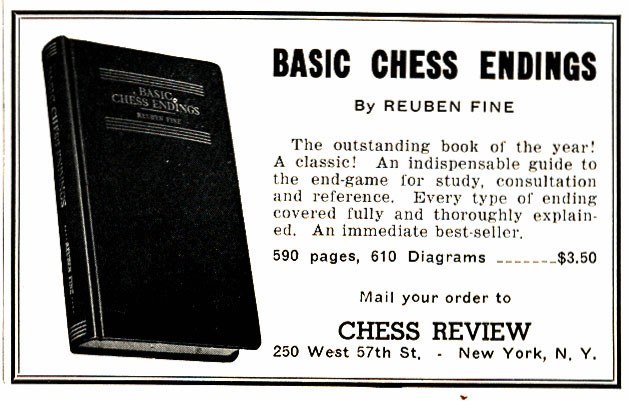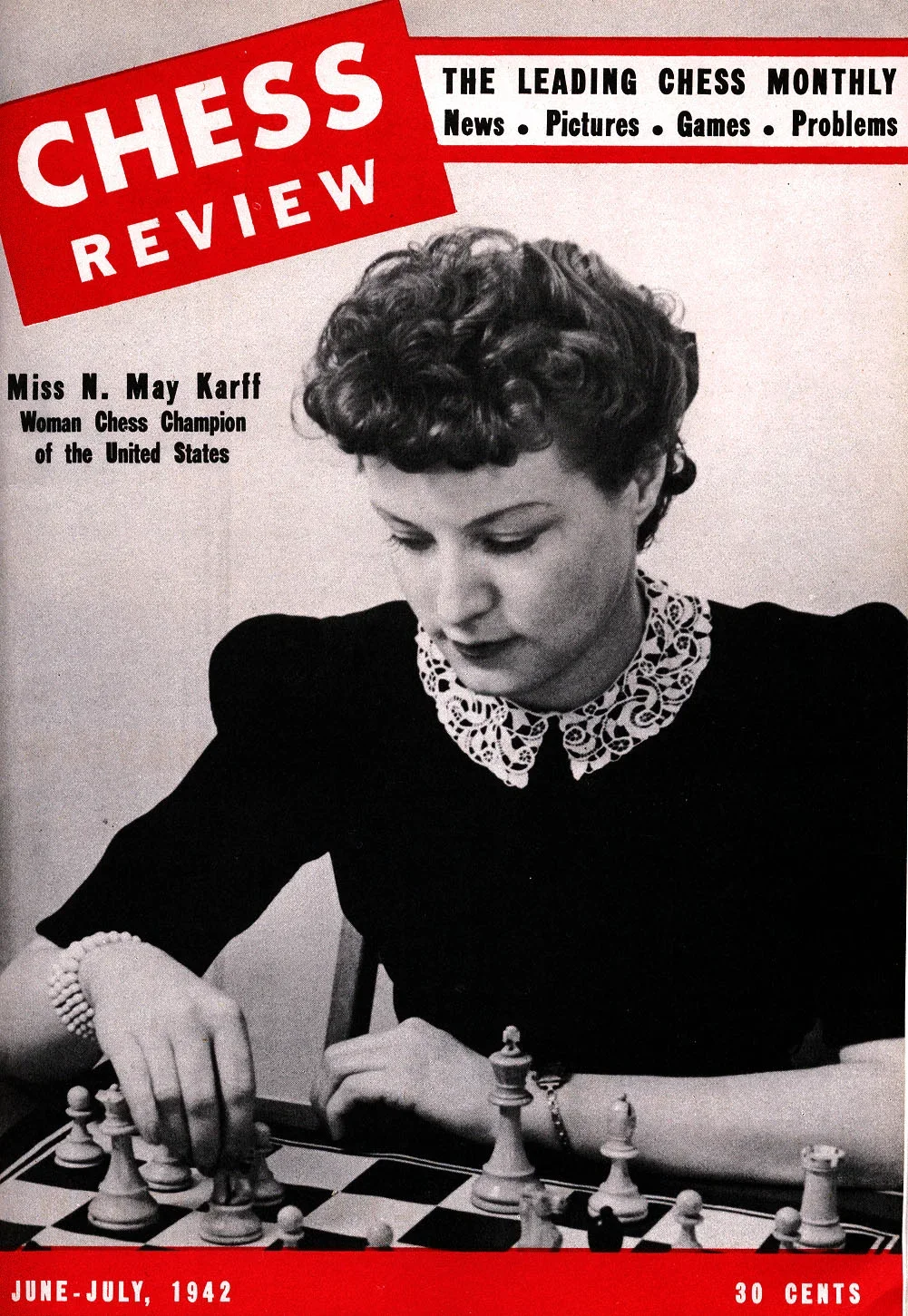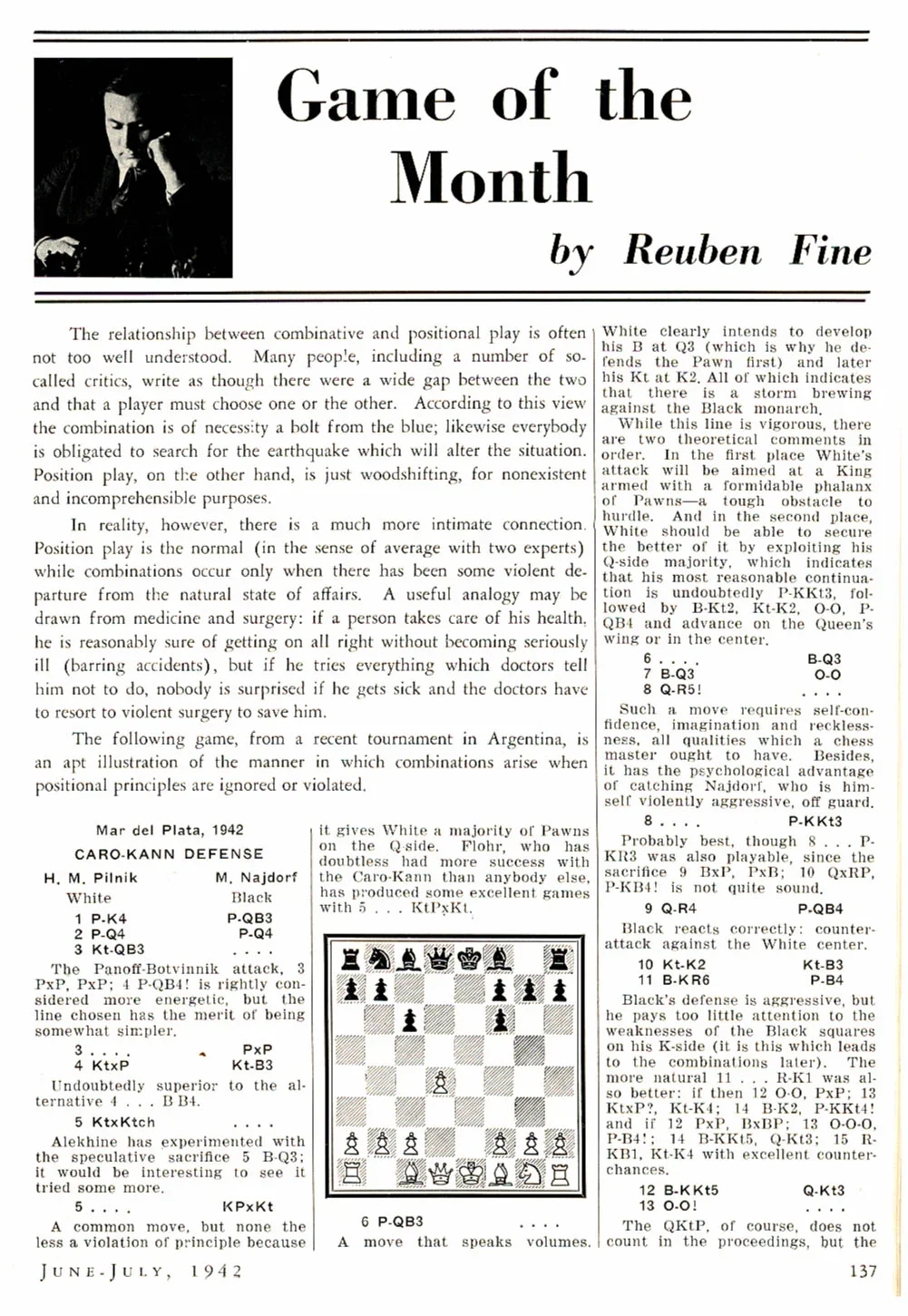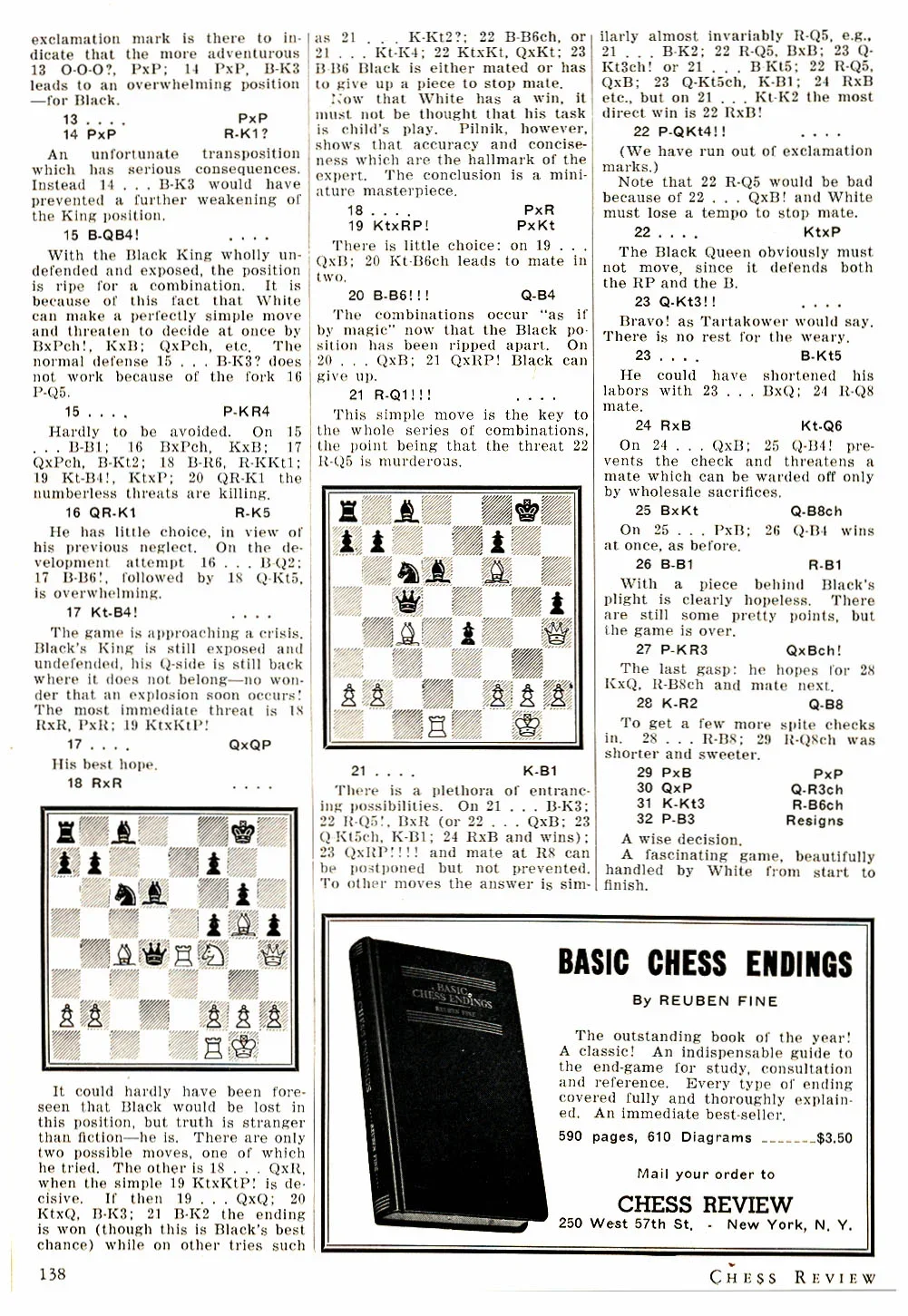Today we inaugurate our new Throwback Thursday series. With so much outstanding material in the US Chess and Chess Life archives – photos, stories, games annotated by the likes of Euwe, Gligoric, and Keres – it seems shameful not to try and bring some of it back to life for modern readers.
And do we have a game for you this week.
 Game of the Month, June-July 1942 Chess Review
Grandmaster Reuben Fine was the Game of the Month columnist for Chess Review from 1941-1949. One of the world's leading players in the 1930s and 1940s, and certainly among the strongest American players of all time, Fine tied for first in the famous 1938 AVRO tournament and won five medals for the United States in Olympiads. He slowed his play after World War II while earning his doctorate in psychology, and eventually retired from active competition in 1951.
Fine was also known for his authorial efforts. He wrote Basic Chess Endings in 1941, one of the fundamental texts of twentieth century chess, and he was the primary author of the sixth edition of the canonical Modern Chess Openings. Fine also penned important texts in psychoanalysis and psychology, including Freudian-inspired studies of chess and chess players.
Game of the Month, June-July 1942 Chess Review
Grandmaster Reuben Fine was the Game of the Month columnist for Chess Review from 1941-1949. One of the world's leading players in the 1930s and 1940s, and certainly among the strongest American players of all time, Fine tied for first in the famous 1938 AVRO tournament and won five medals for the United States in Olympiads. He slowed his play after World War II while earning his doctorate in psychology, and eventually retired from active competition in 1951.
Fine was also known for his authorial efforts. He wrote Basic Chess Endings in 1941, one of the fundamental texts of twentieth century chess, and he was the primary author of the sixth edition of the canonical Modern Chess Openings. Fine also penned important texts in psychoanalysis and psychology, including Freudian-inspired studies of chess and chess players.
 Ad for Basic Chess Endings, Chess Review June-July 1942
Here, in his column from June-July 1942, Fine expertly annotates the brilliant contest between Hermann Pilnik and Miguel Najdorf from Mar del Plata in that same year. Najdorf won the tournament with a score of 13.5/17, and his only loss was to Pilnik, who finished tied for 2nd/3rd with Gideon Stahlberg a half-point behind.
The text of what follows mirrors what appeared in Chess Review, with one difference. We have translated the old Descriptive Notation into modern Algebraic. None of Fine’s analysis is altered, but oversights found by our ‘metal friends’ are included in notes. A pdf version is also available for those who would like to print out the game for over-the-board study.
Enjoy!
Ad for Basic Chess Endings, Chess Review June-July 1942
Here, in his column from June-July 1942, Fine expertly annotates the brilliant contest between Hermann Pilnik and Miguel Najdorf from Mar del Plata in that same year. Najdorf won the tournament with a score of 13.5/17, and his only loss was to Pilnik, who finished tied for 2nd/3rd with Gideon Stahlberg a half-point behind.
The text of what follows mirrors what appeared in Chess Review, with one difference. We have translated the old Descriptive Notation into modern Algebraic. None of Fine’s analysis is altered, but oversights found by our ‘metal friends’ are included in notes. A pdf version is also available for those who would like to print out the game for over-the-board study.
Enjoy!
Game of the Month Chess Review, June-July 1942 Reuben Fine The relationship between combinative and positional play is often not too well understood. Many people, including a number of so-called critics, write as though there were a wide gap between the two and that a player must choose one or the other. According to this view the combination is of necessity a bolt from the blue; likewise everybody is obligated to search for the earthquake which will alter the situation. Position play, on the other hand, is just woodshifting, for nonexistent and incomprehensible purposes. In reality, however, there is a much more intimate connection. Position play is the normal (in the sense of average of with two experts) while combinations occur only when there has been some violent departure from the natural state of affairs. A useful analogy may be drawn from medicine and surgery: if a person takes care of his healthy, he is reasonably sure of getting on all right without becoming seriously ill (barring accidents), but if he tries everything which doctors tell him not to do, nobody is surprised if he gets sick and the doctors have to resort to violent surgery to save him. The following game, from a recent tournament in Argentina, is an apt illustration of the manner in which combinations arise when positional principles are ignored or violated.
 Game of the Month, June-July 1942 Chess Review
Game of the Month, June-July 1942 Chess Review Ad for Basic Chess Endings, Chess Review June-July 1942
Ad for Basic Chess Endings, Chess Review June-July 1942Game of the Month Chess Review, June-July 1942 Reuben Fine The relationship between combinative and positional play is often not too well understood. Many people, including a number of so-called critics, write as though there were a wide gap between the two and that a player must choose one or the other. According to this view the combination is of necessity a bolt from the blue; likewise everybody is obligated to search for the earthquake which will alter the situation. Position play, on the other hand, is just woodshifting, for nonexistent and incomprehensible purposes. In reality, however, there is a much more intimate connection. Position play is the normal (in the sense of average of with two experts) while combinations occur only when there has been some violent departure from the natural state of affairs. A useful analogy may be drawn from medicine and surgery: if a person takes care of his healthy, he is reasonably sure of getting on all right without becoming seriously ill (barring accidents), but if he tries everything which doctors tell him not to do, nobody is surprised if he gets sick and the doctors have to resort to violent surgery to save him. The following game, from a recent tournament in Argentina, is an apt illustration of the manner in which combinations arise when positional principles are ignored or violated.
[pgn]
[Event "Mar del Plata"]
[Site "Mar del Plata"]
[Date "1942.03.23"]
[White "Pilnik, Hermann"]
[Black "Najdorf, Miguel"]
[Result "1-0"]
[ECO "B15"]
[Annotator "Fine, Reuben / jh"]
[PlyCount "63"]
[EventDate "1942.03.11"]
[EventType "tourn"]
[EventRounds "17"]
[EventCountry "ARG"]
[SourceTitle "Chess Review, June/July "]
[Source "ChessBase"]
[SourceDate "1999.07.01"]
[SourceVersion "2"]
[SourceVersionDate "1999.07.01"]
[SourceQuality "1"]
1. e4 c6 2. d4 d5 3. Nc3 ({The Panov-Botvinnik attack,} 3. exd5 cxd5 4. c4 $1 {
is rightly considered more energetic, but the line chosen has the merit of
being somewhat simpler.}) 3... dxe4 4. Nxe4 Nf6 {Undoubtedly superior to the
alternative 4. ... Bf5.} 5. Nxf6+ ({Alekhine has experimented with the
speculative sacrifice} 5. Bd3 {; it would be interesting to see it tried some
more.}) 5... exf6 {[#] A common move, but none the less a violation of
principle because it gives White a majority of Pawns on the Qside.} ({Flohr,
who has doubtless had more success with the Caro-Kann than anybody else, has
produced some excellent games with} 5... gxf6) 6. c3 {A move that speaks
volumes. White clearly intends to develop his Bishop at d3 (which is why he
defended the Pawn first) and later his Knight at e2. All of which indicates
that there is a storm brewing against the Black monarch.} ({While this line is
vigorous, there are two theoretical comments in order. In the first place
White's attack will be aimed at a King armed with a formidable phalanx of
Pawns - a tough obstacle to hurdle. And in the second place, White should be
able to secure the better of it by exploiting his Q-side majority, which
indicates that his most reasonable continuation is undoubtedly} 6. g3 {
followed by Bg2, Ne2, 0-0, c4 and advance on the Queen's wing or in the center.
}) 6... Bd6 7. Bd3 O-O 8. Qh5 $1 {Such a move requires self-confidence,
imagination and recklessness, all qualities which a chess master ought to have.
Besides, it has the psychological advantage of catching Najdorf, who is
himself violently aggressive, off guard.} g6 {Probably best.} ({...though} 8...
h6 {was also playable, since the sacrifice} 9. Bxh6 gxh6 10. Qxh6 f5 $1 {
is not quite sound.}) 9. Qh4 c5 {Black reacts correctly: counter-attack
against the White center.} 10. Ne2 Nc6 11. Bh6 f5 {Black's defense is
aggressive, but he pays too little attention to the weaknesses of the Black
[dark] squares on his K-side (it is this which leads to the combinations later)
.} ({The more natural} 11... Re8 {was also better: if then} 12. O-O ({and if}
12. dxc5 Bxc5 13. O-O-O f5 $1 14. Bg5 ({jh:} 14. Qxd8 Rxd8 $11) 14... Qb6 15.
Rhf1 Ne5 {with excellent counter-chances.}) 12... cxd4 13. Nxd4 $2 Ne5 ({jh:}
13... Re5 $1 {with the idea of ... Rh5:} 14. Be2 g5 15. Nxc6 bxc6 16. Qc4 Be6
$36) 14. Be2 g5 $1) 12. Bg5 Qb6 13. O-O $1 ({The b-pawn, of course, does not
count in the proceedings, but the exclamation mark is there to indicate that
the more adventurous} 13. O-O-O $2 cxd4 14. cxd4 Be6 {leads to an overwhelming
position for Black.}) 13... cxd4 14. cxd4 Re8 $2 {An unfortunate transposition
which has serious consequences.} ({Instead} 14... Be6 {would have prevented a
further weakening of the King position.}) 15. Bc4 $1 {With the Black King
wholly undefended and exposed, the position is ripe for a combination. It is
because of this fact that White can make a perfectly simple move and threaten
to decide at once by Bxf7+!, ... Kxf7, Qxh7+, etc.} h5 {Hardly to be avoided.}
({The normal defense} 15... Be6 $2 {does not work because of the fork} 16. d5)
({On} 15... Bf8 16. Bxf7+ Kxf7 17. Qxh7+ Bg7 18. Bh6 Rg8 19. Nf4 $1 Nxd4 20.
Rae1 {the numberless threats are killing.}) 16. Rae1 ({jh:} 16. Bf6 $1 Na5 17.
Bd3 {with the idea of Qg5, etc.}) 16... Re4 {He has little choice, in view of
his previous neglect.} ({On the development attempt} 16... Bd7 17. Bf6 $1 {
, followed by 18.Qg5, is overwhelming.}) ({jh: Fine gets this wrong. After}
16... Bd7 17. Bf6 {Black gets to equality with} Na5 18. Bd3 (18. Qg5 Nxc4 19.
Qh6 Bxh2+) 18... Re6 {and if} 19. Qg5 $4 Rxf6 20. Qxf6 Bxh2+) 17. Nf4 $1 {
The game is approaching a crisis. Black's King is still exposed and undefended,
his Q-side is still back where it does not belong - no wonder that an
explosion soon occurs! The most immediate threat is 18.Rxe4 fxe4 19.Nxg6!} Qxd4
{His best hope.} 18. Rxe4 {[#] It could hardly have been foreseen that Black
would be lost in this position, but truth is stranger than fiction - he is.
There are only two possible moves, one of which he tried.} fxe4 ({The other is
} 18... Qxe4 {, when the simple} 19. Nxg6 $1 {is decisive. If then} Qxh4 ({
while on other tries such as} 19... Kg7 $2 20. Bf6+ $1) ({or} 19... Ne5 20.
Nxe5 Qxe5 21. Bf6 {Black is either mated or has to give up a piece to stop
mate.}) 20. Nxh4 Be6 21. Be2 {the ending is won (though this is Black's best
chance)}) ({jh: The note for} 18... Qxe4 {requires some attention. The move 19
options appear to be given for White's 21st move, and I had to reconstruct to
the best of my abilities. After} 19. Nxg6 Qxh4 (19... Kg7 $4 20. Bf6+) (19...
Ne5 $4 20. Qxh5 {is mate in six.}) 20. Nxh4 Be6 21. Be2 {modern engines think
White is only slightly better.}) 19. Nxh5 $1 gxh5 ({There is little choice: on
} 19... Qxc4 20. Nf6+ {leads to mate in two.}) 20. Bf6 {!!!} Qc5 {The
combinations occur "as if by magic" now that the Black position has been
ripped apart.} ({On} 20... Qxc4 21. Qxh5 $1 {Black can give up.}) 21. Rd1 {
[#] !!! This simple move is the key to the whole series of combinations, the
point being that the threat 22.Rd5 is murderous.} Kf8 {There is a plethora of
entrancing possibilities.} ({On} 21... Be6 22. Rd5 $1 Bxd5 23. Qxh5 {!!! and
mate at h8 can be postponed but not prevented.}) ({To other moves the answer
is similarly almost invariably 22.Rd5, e.g.,} 21... Bg4 22. Rd5 Qxc4 23. Qg5+
Kf8 24. Rxd6 {etc.,}) ({but on} 21... Ne7 {the most direct win is} 22. Rxd6 $1)
({jh:} 21... Ne7 22. Rxd6 $2 {throws the advantage away after} (22. b4 $1 {
and Black has the unattractive choice between heavy material loss and mate, i.
e.} Qxb4 $2 23. Qxh5 {is mate on f7 or h8!}) 22... Qxd6 23. Qg5+ Kf8 24. Qg7+
Ke8 25. Qxf7+ Kd8 26. Qg8+ Kc7 27. Qg7 {(with the idea 28.Be5!)} Qc5 28. b3 {
and White has enough for the draw but not more.}) 22. b4 $3 {(We have run out
of exclamation marks.)} ({Note that} 22. Rd5 {would be bad because of} Qxc4 $1
{and White must lose a tempo to stop mate.}) 22... Nxb4 {The Black Queen
obviously must not move, since it defends both the h-pawn and the Bishop.} 23.
Qg3 $3 {Bravo! as Tartakower would say. There is no rest for the weary.} Bg4 ({
He could have shortened his labors with} 23... Bxg3 24. Rd8#) 24. Rxd6 Nd3 ({On
} 24... Qxc4 25. Qf4 $1 {prevents the check and threatens a mate which can be
warded off only by wholesale sacrifices.}) 25. Bxd3 Qc1+ ({On} 25... exd3 26.
Qf4 {wins at once, as before.}) 26. Bf1 Rc8 {With a piece behind Black's
plight is pretty hopeless. There are still some pretty points, but the game is
over.} 27. h3 Qxf1+ $1 {The last gasp:} 28. Kh2 ({he hopes for} 28. Kxf1 Rc1+ {
and mate next.}) 28... Qc1 {To get a few more spite checks in.} (28... Rc1 29.
Rd8# {was shorter and sweeter.}) 29. hxg4 hxg4 30. Qxg4 Qh6+ 31. Kg3 Rc3+ 32.
f3 {A wise decision. A fascinating game, beautifully handled by White from
start to finish.} 1-0
[/pgn]
If you'd prefer to download a print copy of the game in pdf format for over-the-board replay, click this link.Categories
Archives
- January 2026 (13)
- December 2025 (27)
- November 2025 (29)
- October 2025 (39)
- September 2025 (27)
- August 2025 (29)
- July 2025 (43)
- June 2025 (25)
- May 2025 (24)
- April 2025 (29)
- March 2025 (29)
- February 2025 (20)
- January 2025 (24)
- December 2024 (34)
- November 2024 (18)
- October 2024 (35)
- September 2024 (23)
- August 2024 (27)
- July 2024 (44)
- June 2024 (27)
- May 2024 (31)
- April 2024 (51)
- March 2024 (34)
- February 2024 (25)
- January 2024 (26)
- December 2023 (29)
- November 2023 (26)
- October 2023 (37)
- September 2023 (27)
- August 2023 (37)
- July 2023 (47)
- June 2023 (33)
- May 2023 (37)
- April 2023 (45)
- March 2023 (37)
- February 2023 (28)
- January 2023 (31)
- December 2022 (23)
- November 2022 (32)
- October 2022 (31)
- September 2022 (19)
- August 2022 (39)
- July 2022 (32)
- June 2022 (35)
- May 2022 (21)
- April 2022 (31)
- March 2022 (33)
- February 2022 (21)
- January 2022 (27)
- December 2021 (36)
- November 2021 (34)
- October 2021 (25)
- September 2021 (25)
- August 2021 (41)
- July 2021 (36)
- June 2021 (29)
- May 2021 (29)
- April 2021 (31)
- March 2021 (33)
- February 2021 (28)
- January 2021 (29)
- December 2020 (38)
- November 2020 (40)
- October 2020 (41)
- September 2020 (35)
- August 2020 (38)
- July 2020 (36)
- June 2020 (46)
- May 2020 (42)
- April 2020 (37)
- March 2020 (60)
- February 2020 (38)
- January 2020 (45)
- December 2019 (34)
- November 2019 (35)
- October 2019 (42)
- September 2019 (45)
- August 2019 (56)
- July 2019 (44)
- June 2019 (35)
- May 2019 (40)
- April 2019 (48)
- March 2019 (61)
- February 2019 (39)
- January 2019 (30)
- December 2018 (29)
- November 2018 (51)
- October 2018 (45)
- September 2018 (29)
- August 2018 (49)
- July 2018 (35)
- June 2018 (31)
- May 2018 (39)
- April 2018 (31)
- March 2018 (26)
- February 2018 (33)
- January 2018 (30)
- December 2017 (26)
- November 2017 (24)
- October 2017 (30)
- September 2017 (30)
- August 2017 (31)
- July 2017 (28)
- June 2017 (32)
- May 2017 (26)
- April 2017 (37)
- March 2017 (28)
- February 2017 (30)
- January 2017 (27)
- December 2016 (29)
- November 2016 (24)
- October 2016 (32)
- September 2016 (31)
- August 2016 (27)
- July 2016 (24)
- June 2016 (26)
- May 2016 (19)
- April 2016 (30)
- March 2016 (36)
- February 2016 (28)
- January 2016 (32)
- December 2015 (26)
- November 2015 (23)
- October 2015 (16)
- September 2015 (28)
- August 2015 (28)
- July 2015 (6)
- June 2015 (1)
- May 2015 (2)
- April 2015 (1)
- February 2015 (3)
- January 2015 (1)
- December 2014 (1)
- July 2010 (1)
- October 1991 (1)
- August 1989 (1)
- January 1988 (1)
- December 1983 (1)










